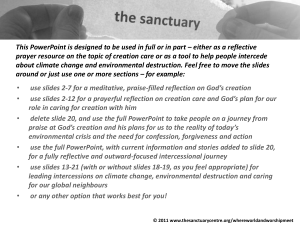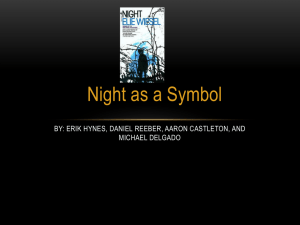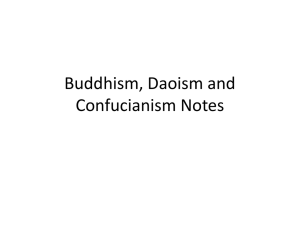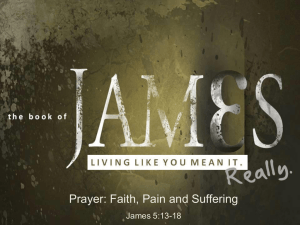Click here - Anglican Diocese of Edmonton
advertisement
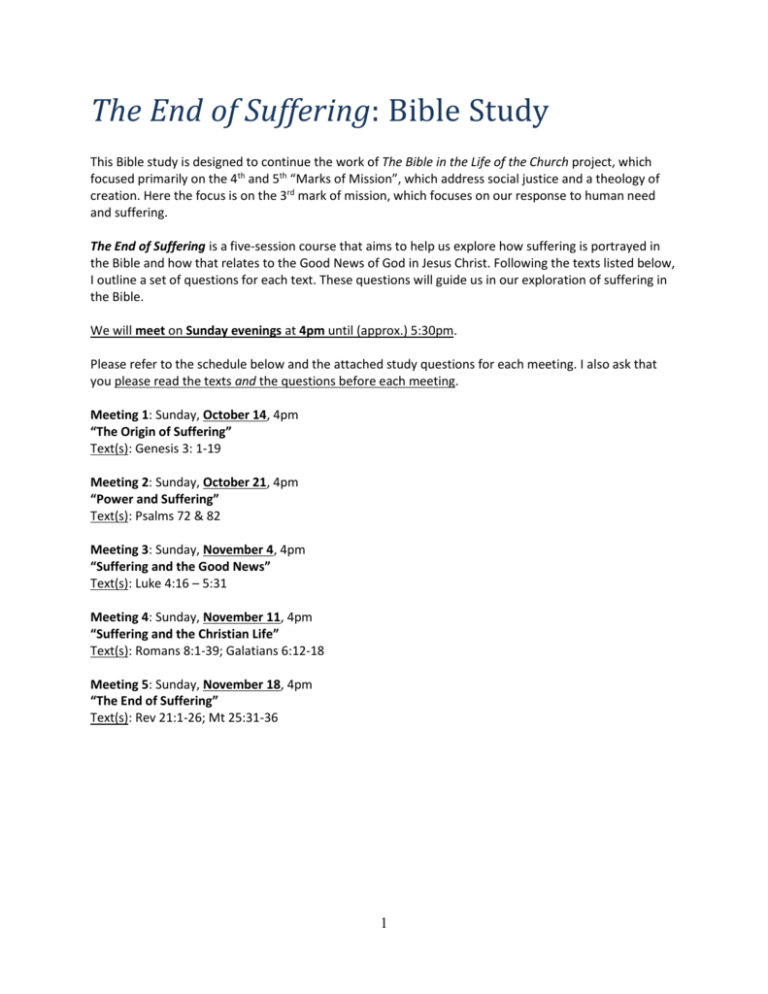
The End of Suffering: Bible Study This Bible study is designed to continue the work of The Bible in the Life of the Church project, which focused primarily on the 4th and 5th “Marks of Mission”, which address social justice and a theology of creation. Here the focus is on the 3rd mark of mission, which focuses on our response to human need and suffering. The End of Suffering is a five-session course that aims to help us explore how suffering is portrayed in the Bible and how that relates to the Good News of God in Jesus Christ. Following the texts listed below, I outline a set of questions for each text. These questions will guide us in our exploration of suffering in the Bible. We will meet on Sunday evenings at 4pm until (approx.) 5:30pm. Please refer to the schedule below and the attached study questions for each meeting. I also ask that you please read the texts and the questions before each meeting. Meeting 1: Sunday, October 14, 4pm “The Origin of Suffering” Text(s): Genesis 3: 1-19 Meeting 2: Sunday, October 21, 4pm “Power and Suffering” Text(s): Psalms 72 & 82 Meeting 3: Sunday, November 4, 4pm “Suffering and the Good News” Text(s): Luke 4:16 – 5:31 Meeting 4: Sunday, November 11, 4pm “Suffering and the Christian Life” Text(s): Romans 8:1-39; Galatians 6:12-18 Meeting 5: Sunday, November 18, 4pm “The End of Suffering” Text(s): Rev 21:1-26; Mt 25:31-36 1 THE END OF SUFFERING: BIBLE STUDY 1. The Origin of Suffering Text: Genesis 3: 1-19 a. What are the results of Adam’s and Eve’s actions? What effect do they have on them? On creation? b. What is significant about Adam and Eve covering themselves? What does this tell us about the effects of their actions? 2. Power and Suffering Texts: Psalms 72 & 82 Psalm 72 is a royal psalm and contains a prayer for the Davidic king. It is not entirely clear if vv. 2-15 express a prayer or anticipate a future reign. Whether a prayer, vision, or combination of the two, the psalm depicts the king’s universal rule of peace and prosperity. As such it is indirectly messianic, for the ideal it expresses will only be fully realized during the Messiah’s earthly reign. Psalm 82 pictures God standing in the “assembly of El” where he accuses the “gods” of failing to promote justice on earth. God pronounces sentence upon them, announcing that they will die like men. Having witnessed the scene, the psalmist then asks God to establish his just rule over the earth. a. What is the vision of justice we see in Ps 72? b. How does Ps 72 relate to God’s Kingdom as proclaimed in the New Testament (by Jesus) and Jesus claims to be the Messiah? c. What do Ps. 82:3-4 tell us about the nature of suffering and what our response is to be to it? d. Do these texts tell us anything about how we, as God’s people, should engage in social action? 3. Suffering and the Good News Text: Luke 4:16 – 5:31 This text is giving Luke’s basic understanding of the Gospel Jesus came to proclaim. Lk 4:17-19 is a quotation from Isa 61:1-2a. Within the citation is a line from Isa 58:6, with its reference to setting the oppressed free. a. How do you think Luke interprets the Gospel of Jesus? How does he see Isaiah’s prophecy being fulfilled? b. In this text, what is the connection between suffering and sin? 2 c. How should we respond to human suffering in the light of this text? 4. Suffering and the Christian Life Texts: Romans 8:1-39; Galatians 6:12-18 a. How does Paul understand suffering cosmically (in the light of creation) in this text? b. What makes suffering bearable for Paul, and what role does he see it playing in his life? c. In Romans 1:1, Paul tells us that he writes this letter as a “slave” (literally, “doulos” – which often indicates one who sells herself into slavery to another) of “Christ Jesus” (literally, “Messiah-Jesus”). Does that perspective help you understand Paul’s view of suffering in this passage? Why/not? d. How does Paul think we should respond to human suffering? 5. The End of Suffering Texts: Rev 21:1-26; Mt 25:31-36 a. What is the connection between judgment and the end of suffering in these texts? b. Why is there no temple in Rev 21:22? c. How do these texts connect back to Genesis 3 and its account of suffering? 3

